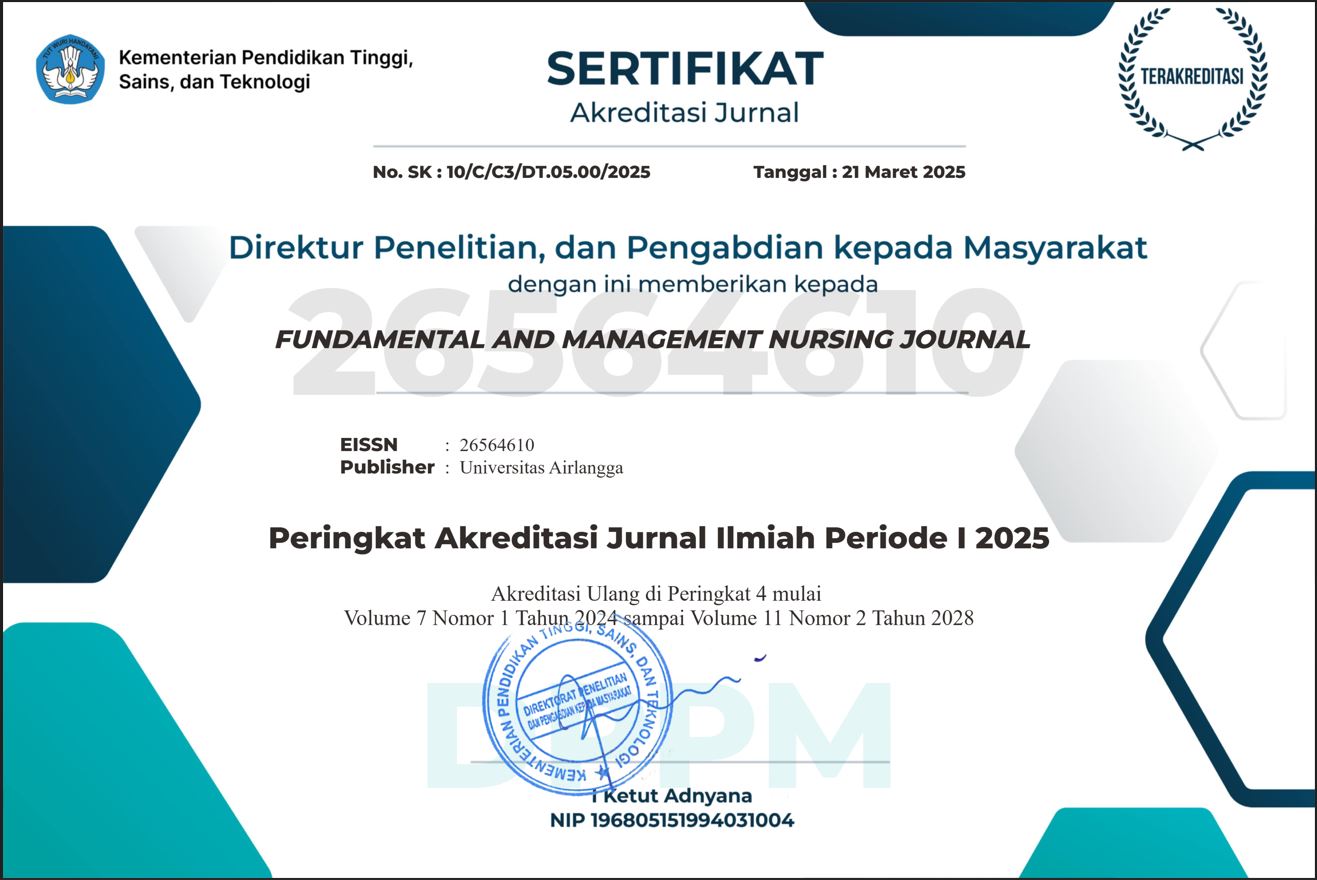Nurse Responsiveness and Empathy as Predictors of Patient Loyalty: A Cross-Sectional Study in Hospital Care Settings
Introduction: Patient loyalty serves as an important indicator in evaluating the overall quality of nursing services within hospital settings. Loyalty reflects a crucial determinant of hospital competitiveness and sustainability. This study aims to analyze the relationship between nurse responsiveness, empathy, and patient loyalty in the hospital service environment.
Method: This quantitative cross-sectional study involved 62 patients as respondents using accidental sampling techniques. Patient in the ward patients admitted to the ward during January. Data were collected through questionnaires to measure nurses' responsiveness and empathy through patient perceptions, as well as the Patient Loyalty Questionnaire (PLQ), which includes dimensions of attitudinal loyalty, behavioral loyalty, word of mouth, and recommendation intentions. Data were analyzed using Spearman correlation and Ordinal Logistic Regression.
Results: Patient perceptions of nurse responsiveness showed that more than half (66.1%) were in the good category. Similarly, patient perceptions of nurse empathy showed that more than half (71%) were in the good category. Some patients (54.9%) had high loyalty. Analysis of the relationship between responsiveness and loyalty (p=0.001 and r=0.69) and between empathy and loyalty (p=0.001 and r=0.59). Both results indicate that responsiveness and empathy are related to loyalty with the strength of the relationship in the strong category
Conclusions: Nurses' responsiveness and empathy are important factors influencing patient loyalty. Hospital management needs to develop training programs to strengthen nurses' skills in responding to patient needs quickly and effectively, as well as work systems that support nurses' quick, responsive, and timely responses in interacting with patients, so that patients feel satisfied and become loyal.
1. INTRODUCTION
In the world of health services in hospitals, nursing services are one of the fundamental aspects that determine the overall quality of care. Nurses, as the largest group of health professionals, play a central role in providing continuous, holistic, and patient-centered care(Moi et al., 2019). Their interactions with patients are not limited to clinical procedures but also include communication, emotional support, and responsiveness to individual needs. Consequently, the quality of nursing services is often a decisive factor in shaping patients' perceptions of hospital performance. Patient trust, satisfaction, and ultimately loyalty are strongly influenced by how effectively nurses demonstrate both professional competence and humanistic values, such as empathy and attentiveness(Mashudi, 2025)(Rohayani et al., 2024). These aspects highlight the importance of examining how specific dimensions of nursing care-particularly responsiveness and empathy, contribute to patient loyalty in hospital service environments.
Patients' perceptions of the quality of these interactions can directly impact satisfaction. Regarding patient-nurse interactions, responsiveness and empathy are two dimensions of nursing care that contribute significantly to patient satisfaction and engagement(Tyneke et al., 2023). Responsiveness refers to the speed and responsiveness of nurses in responding to the physical and emotional needs of patients, reflecting the nurse's ability to recognize patient requests and respond quickly and appropriately(Rakhmawati & Suhartini, 2023)(Saprilla, 2018). On the other hand, empathy is the nurse's ability to understand and feel what the patient is experiencing, building a therapeutic relationship filled with trust, safety, and emotional comfort. These two aspects are essential foundations for humane and highquality nursing care.(Butarbutar & Fathi, 2018)(Hasim et al., 2018).
The novelty of this research lies in its focus on nurses' responsiveness and empathy as predictors of patient loyalty. Responsiveness describes the nurse's accuracy and speed in responding to patient needs, while empathy indicates the nurse's ability to understand the patient 's feelings, complaints, and expectations(Sari, 2023)(Hasan, 2022). While these two aspects have often been positioned as moral values in nursing practice, they have rarely been scientifically tested as determinants of patient loyalty. Furthermore, the approach used also provides a new perspective. While most patient loyalty studies measure it through marketing indicators like Net Promoter Score or overall satisfaction, this study emphasizes the interpersonal relationship between nurses and patients as the primary variable. This perspective demonstrates that loyalty stems not solely from the technical quality of hospital services, but also from the patient's emotional experience when interacting with empathetic and responsive nurses. To date, research on patient loyalty in Indonesia is relatively limited and tends to focus on aspects of service satisfaction or the quality of hospital facilities. Few studies have specifically examined the role of nurse responsiveness and empathy as predictors of patient loyalty, even though both factors are directly related to patients' experiences during care. This research gap is the primary reason why this study is important, providing a deeper understanding of how the quality of nursing interactions can strengthen patient loyalty to hospital services. Individual satisfaction will impact loyalty, which is a patient's commitment to return to the service and recommend it to others. This loyalty not only reflects satisfaction but also serves as an indicator of the success of patient-centered services(Alodhialah et al., 2024)(Nurholifah et al., 2024). Loyal patients tend to return for further services and recommend the hospital to others. This will undoubtedly have a positive impact on the sustainability of healthcare organizations. Although numerous studies have examined the determinants of patient satisfaction, few have specifically examined how interpersonal dimensions of nursing care, such as empathy and responsiveness, influence patient loyalty, particularly in the context of inpatient care.
Individual satisfaction will impact loyalty, which is a patient's commitment to return to the service and recommend it to others. This loyalty not only reflects satisfaction but also serves as an indicator of the success of patient-centered services(Alodhialah et al., 2024)(Nurholifah et al., 2024). Loyal patients tend to return for further services and recommend the hospital to others. This will undoubtedly have a positive impact on the sustainability of healthcare organizations. Although numerous studies have examined the determinants of patient satisfaction, few have specifically examined how interpersonal dimensions of nursing care, such as empathy and responsiveness, influence patient loyalty, particularly in the context of inpatient care.
Various studies in Indonesia over the past five years have shown that patient loyalty still needs to be significantly improved. A Net Promoter Score (NPS) survey at a hospital in Jakarta recorded an average score of 57.5% in 2021, indicating that not all patients are active promoters of patient care(Prakoeswa et al., 2022). Another study at a private hospital in Tangerang also confirmed that aspects such as service quality, trust, and patient assessment have a positive influence on patient loyalty(Yusup & Mulyandi, 2022). The results of other studies show that quality service by service providers and the physicalpsychosocial environment contribute directly to patient behavioural loyalty(Sudibyo & Keni, 2025). This confirms that the quality of interaction and support of the service system is crucial for building loyalty.
However, most hospitals currently still focus on quality evaluation on structural and technical aspects such as infrastructure, medical technology, and waiting times, so that interpersonal dimensions such as empathy and nurse responsiveness often do not receive much attention. The emotional dimension of service, especially that related to effective communication and
Copyright (c) 2025 Dhina Widayati, Diana Rachmania

This work is licensed under a Creative Commons Attribution 4.0 International License.
1. The journal allows the author to hold the copyright of the article without restrictions.
2. The journal allows the author(s) to retain publishing rights without restrictions.
3. The legal formal aspect of journal publication accessibility refers to Creative Commons Attribution (CC BY).
















